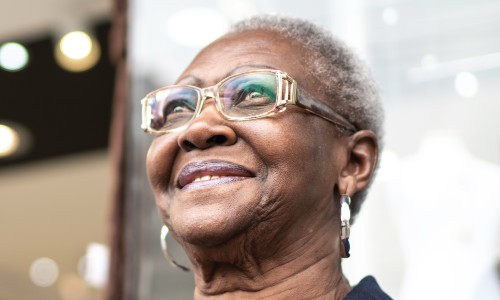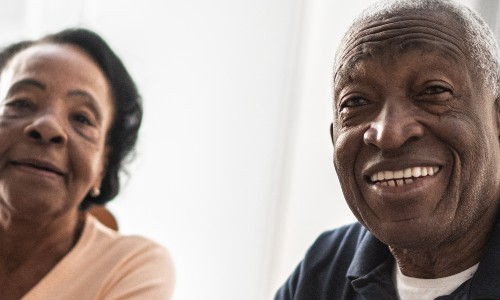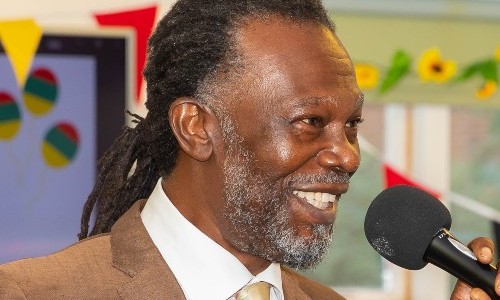My role is to influence the behaviour of an individual – in helping them to think and act more inclusively than they did before. When organisations I work with start to see positive changes in peoples’ behaviour, that’s when I know I’ve done my job.
Age UK began conversations about race with me following the untimely death of George Floyd in 2020, with the aim to better understand the lived experiences of employees from Black and ethnic minority communities.
Our ‘lived experience’ helps to shape and form our value systems and what we hold dear. My father was Barbadian, and my mother was St Lucian, so on the face of things I came from typical Black West Indian family. But my grandmother on my father’s side was Chinese. My stepfamily, meanwhile, is White and Irish. Diversity was therefore my norm from the off, and that’s helped shape my perspective on the world.
Telling stories
To help make concepts about diversity and inclusion land with people, I like to tell stories. I was born in the UK in the sixties and as a young child raised in the seventies, experienced challenging times through the lens of my race. It was therefore important to get a sense of self, because as the adage says, ‘to know where you’re going you have to know where you come from’.

My mother would proudly tell me stories about my grandfather (M. Thomas), who was anonymous to me, and how he’d supported the war effort during the First World War. I listened to what she told me, but I didn’t believe it. So, I went to school and asked my teacher, Mr Turner, about what my mum had told me, fully expecting him to say, ‘Sorry Pete, your mum’s wrong’. It floored me when he said she was right.
At that time, there was no mention of Black people having fought in the First World War, so my mind began racing when I found this out and that was my catalyst to find out more. Living in South London, I had the opportunity to go to Black bookshops. I read about this British West Indian Regiment who consisted of volunteers who weren’t allowed to fight at the time, as they weren’t deemed worthy, but supported forces in their various roles. My grandfather was one of those volunteers.
A change of perception
Before this discovery, when my white friends would talk about their grandfathers and fathers fighting in the First and Second World Wars, I never felt I could take part in those conversations. After the discovery, however, that dynamic and that perception changed. It gave me a sense of pride. It also made me angry, of course, as to why at that time Black contributions to the wars weren’t openly discussed.
By sharing that story about my grandfather, I’m hopefully helping to correct the mistruths and show people that Black history in Britain goes way back before Windrush.
Black History Month is a great marker, not just to recognise the contribution of people from Black and ethnic minority communities, but to say to them: we see you; we hear you; we value you. One of the key personal drivers to me working with Age UK was my dad. He was a councillor for Lambeth Council for many years, and when he gave that up, he became an advisor for what was then Age Concern. His role was to advise older people in the community on their rights and their benefits.
If you can’t see it, you can’t be it
What was interesting for me when I started working with Age UK was the lack of Black role models in a similar role. Given that my dad had done it, I thought I’d see similar people at Age UK in droves given that it was years later, so that was a surprise. The important thing to remember for Black people in that context is: if they can’t see it as a professional opportunity, then they can’t be it. And that’s the case with aging too. If a younger Black person doesn’t see older Black people on Age UK’s website or part of its services, then the charity won’t be front of mind when family members (and themselves) get older.
Intersectionality
Then there are the additional issues that come when there’s the intersectionality of diverse characteristics, specifically around age and ethnic background. Both of those characteristics are challenging, but when you combine them, we start to understand the subtle nuances. The challenge for an organisation like Age UK is understanding this complexity. Having homogeneous groups makes life so much easier, but in truth, the world doesn’t work that way. The world is far more complex than that and it’s getting more complex and more diverse, so we’re playing catch up. For some, it’s a challenge; for others, it’s an opportunity.
We wanted to broaden the conversation with Age UK to look at race but also focus on inclusion, by ensuring we understand the impact of different types of behaviours and micro-inequities, which refers to the ways in which individuals are singled out or overlooked based on characteristics such as race. It’s also about understanding the implications of privilege and recognising that it’s not about blame but about recognising that certain groups when we talk about race, exhibit privilege more than other racial groups in terms of wider societal values. That’s not the fault of the individual; that’s just the way it is.
Developing confidence and competence
The goal here is to develop the confidence and the competence of individuals in Age UK to talk about race openly and honestly. It’s not a Black-only subject; everybody has a buy-in and everybody has a voice. Essentially, it’s about everybody becoming an ally. You may be uncomfortable at first discussing this topic, but that’s a good thing. It shows that you’re growing, and your mind is opening. The more we engage, the more we start to feel comfortable.
Diversity is about difference - not just visible difference, but all the aspects that make us different from one another and unique individuals. But you need to have the inclusion element too. The inclusion element focuses on having the capacity to consciously listen to seldom heard voices and help to amplify those voices to ensure they’re heard, and their insights are valued. Because if you don’t feel like you’re being valued, then you don’t feel that you belong.





